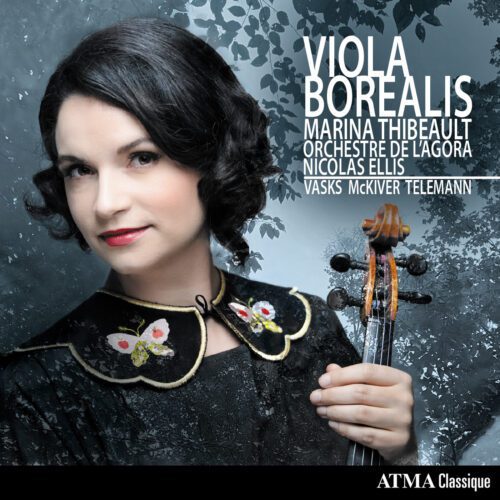What an original, stimulating and contrasting programme! Marina Thibeault is the leading viola soloist that Quebec and Canada have been waiting for. Of course, we have known many excellent violinists who have played the viola with panache, but a local artist who identifies specifically and with such talent with this little-known and underrated instrument? The time had come!
The programme brings together contrasting sound worlds by programming the most recent of the viola concertos, at least until proven otherwise (that of the Latvian Peteris Vasks) and the first in history, in all likelihood (that of Telemann). Added to this are two pieces for solo viola by the Canadian-born, partly Anishinabe Melody McKiver. Canada, Latvia and northern Germany (Telemann worked largely in Hamburg) incidentally make up the conceptual fabric of the album (the Borealis of the title).
The Vasks Concerto is an accessible and very attractive work. The first movement is all long, sweeping phrases, supported by an attractive tonal cushion that expresses a narrative dynamic of tenderness and melancholy. The cinematic quality of its writing induces strong dramatic impressions. The second movement is dance-like, with folk-trad accents, while the third movement takes on tragic, almost funereal colors, in a sustained back-and-forth between strong pathos and exuberant nervousness that struggles to stay under control. The final chapter of this poignant and grandiose tale first brings us back to an effusive dialogue between the viola and the orchestra’s darkly planted strings, where the shadow of Arvo Pärt appears (I am thinking here of the Estonian’s Cantus). The journey ends gently, the viola gradually and solitarily receding, leaving us emotionally satiated but ready to repeat the experience any time soon.
Marina’s fleshed-out, powerfully communicative, and adequately nuanced playing leaves its mark on us and cannot leave anyone indifferent. The Agora orchestra, conducted by Nicolas Ellis, supports her with great care. Wonderful!
McKiver’s Ningodwaaswi and Niizh for solo viola are sober, introspective, and intimate soliloquies. McKiver uses them as a vehicle to reflect on his/her (McKiver is non-binary) Anishinabe origins and on the effects, especially the wounds, of the unfortunate episode of residential schools. Marina Thibeault seems to be in perfect harmony with the character of the pieces, which are both touching and uncluttered. The repetitive minimalist language makes the two short works easy to appreciate without making them overly sentimental.
Telemann’s Concerto for G major, TWV 51: G9 has the reputation of being the first of its kind in history. The mark of the Italian Baroque is strong, with eminently Vivaldian and Corellian overtones. It is a luminous, dashing and melodically catchy work. Marina and the Agora orchestra demonstrate that the achievements of historically informed playing have indeed permeated the collective consciousness of contemporary musicians, even those who do not specialise in strict ‘baroque’ repertoire and instrumentation.
A great success.
























